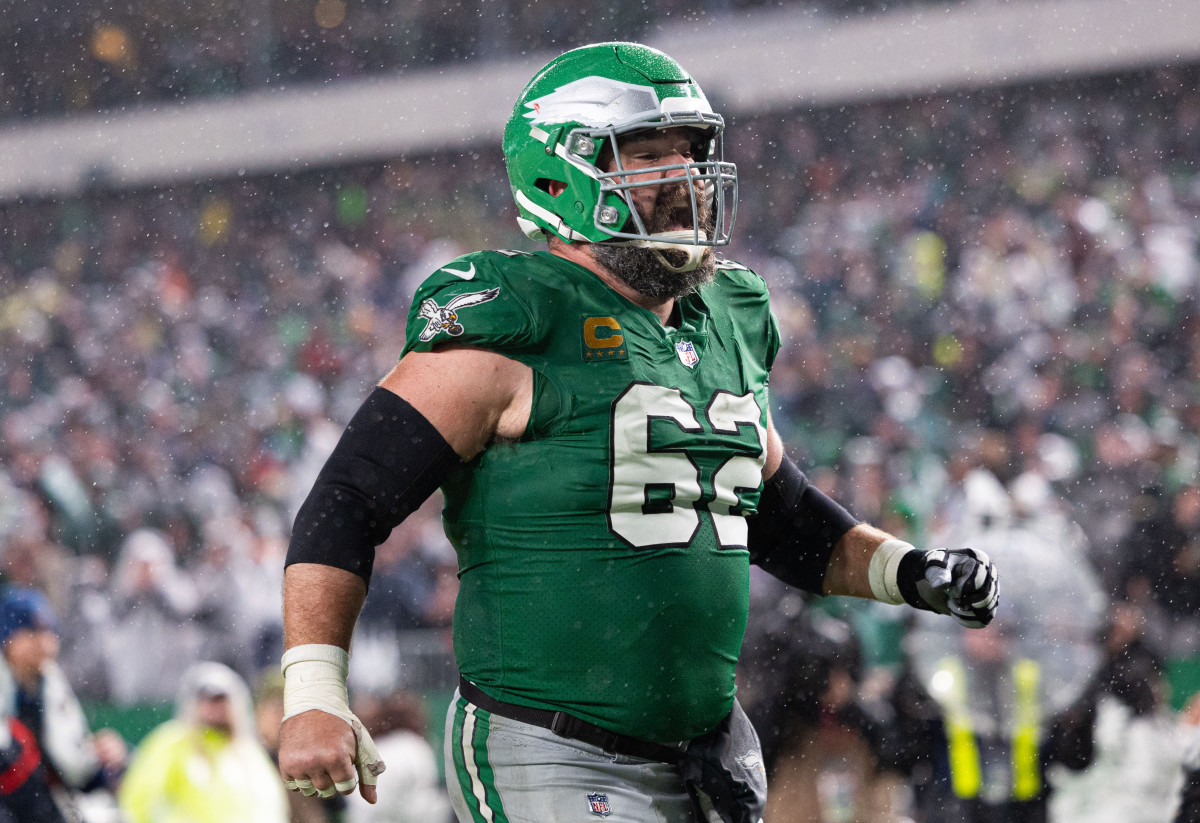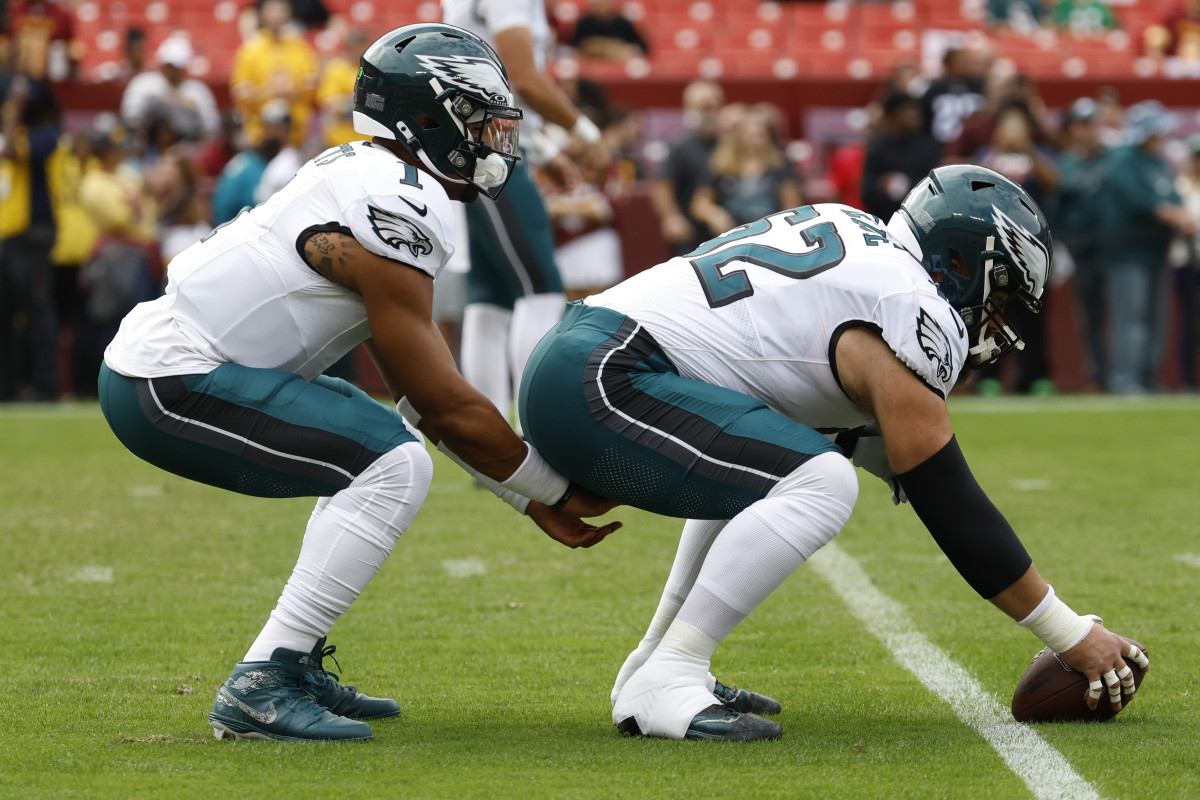Jason Kelce’s Retirement Means the Departure of an Unexpected Eagles Epicenter
Philadelphia Eagles center Jason Kelce announced his retirement Monday amid a tear-soaked ode to the merits of hard work. Clad in a sleeveless T-shirt, the center aimed to leave the building in his default armor; as someone who could synonymously blend into the environment and also come to define it.
The facts we know at this point in time are all but cemented. Kelce will go down as one of the greatest players to snap a football and one of the greatest offensive linemen. Period. He will be in the Hall of Fame. He will go down as one of the greatest siblings in the history of siblings, having resuscitated the career of his wayward brother, Travis, and setting the younger Kelce up for a Hall of Fame career as well. He will go down as one of the great stewards of a football program, having achieved the impossible: unanimous likability of a city notorious for its prickliness and short memory. He will go down as one of the great ambassadors of a sacred football space, taking long stretches of time to explain the complexities of the game to inquiring reporters, and letting us in at a time when the league and most of its member clubs were intent on curbing us out. He will go down as one of the best members of a locker room, having a unique understanding of how people fit into an environment and what part he could play in making the entire orchestra run.

It is that last point that may linger on, and is the one we should earmark today, a few months before the Eagles report back to the facility for offseason training activities. Beyond all the well-deserved tributes, perhaps our greatest realization about Kelce will come down the road. We did not really understand Tom Brady until we saw him yanked from the New England Patriots and plugged into another outlet, only to provide the same luminosity. There is no doubt that Kelce will brighten any broadcast booth or studio set he walks onto. There is a question as to how the Eagles will move on from a player who was all parts stalwart, psychiatrist, philosopher, motivator, brother and friend.
We may only think quarterbacks have that kind of power. We are about to find out that is not the case.
It’s always hard to watch a retirement press conference. Players are removing themselves from an IV drip of dopamine that, if they were good enough to merit a retirement press conference, has probably lasted for at least a decade. Their lives are about to change and alter in meaning similar to someone who endured a cross-country move, a death in the family or a miracle birth. It’s normally a tad emotional, counterbalanced by the relief a player has in no longer subjecting himself to the absurdity that is professional football. But Kelce had to make all manner of dad sound effects—usually the way we sound getting out of a chair, picking up leaves or revving the lawn mower—just to keep himself from sobbing; from breaking down. He struggled in a way that was indicative of his love for the job. For his love of fellow people. For his love of football.
That was the purest distillation of Kelce’s value. Everyone has a story, especially those who had spent 13 years around him. Here’s mine, from roughly 13 minutes: Before the team competed in Super Bowl LVII, I stood in an emptying locker room with Kelce, listening to him relay a story about Kobe Bryant, who had visited with the team during the lead up to Super Bowl LII. The center talked about Bryant’s work ethic and how Bryant’s lasting point was that greatness comes from an ability to stay curious. Kelce had noted to me that he sat next to Jalen Hurts in every team meeting that year, and that Hurts had that innate curiosity.
But what Kelce left out is that Hurts knew the veteran was the team’s epicenter, and that sitting next to Kelce was essential for the growth of the young quarterback. Tying them at the hip was part of the plan.

Kelce also talked about the Eagles as a living, breathing entity. He noted how he saw players when he was younger who wouldn’t work, or who would present the team with some kind of problem or issue based on their personality. Kelce noted how that didn’t seem to be the case anymore, and how the Eagles had become known—like the Patriots during the height of the Bill Belichick–Brady dynasty—as a team that could absorb any personality and mold them into a productive member of the unit. He said he wasn’t exactly sure why that was.
He left out that he was the reason why.
Throughout this recent stretch of success that included a pair of Super Bowl appearances, Kelce had his hands in everything. He simply refused to take credit for it.
Here’s something we don’t talk a lot about: An NFL facility is not, by default, a helpful place. Regardless of what platitude a coach uses to describe his culture, these are locker rooms of political Darwinism and survivalism. We wonder why more players don’t “watch the film” without the inherent knowledge that almost none of them are taught how to watch film like a professional. Coaches are mostly responsible for the game plan. Players are responsible for themselves. Ask the best how they learned to be the best, and they’ll talk about stumbling into some private session with another all-time great and being extended a lifeline.
For how many people was Kelce that lifeline? For how many plays was Kelce the one responsible for not only throwing the key block, but for also ensuring that everyone around him knew where they were going? For how many moments when Hurts was still figuring himself out, and matching up his internal confidence with the stone facade he had constructed for himself to be displayed to the outside world, was Kelce the one who knelt down and allowed Hurts to figuratively stand on his shoulders? For how many internal disputes was he the peacemaker?
Again, we are about to find out. My bet? More than we will ever know. But enough to understand that he will redefine the way we look at leadership in the NFL, and the unexpected places from where it can come.
